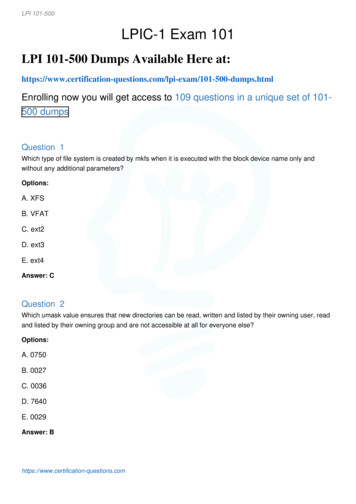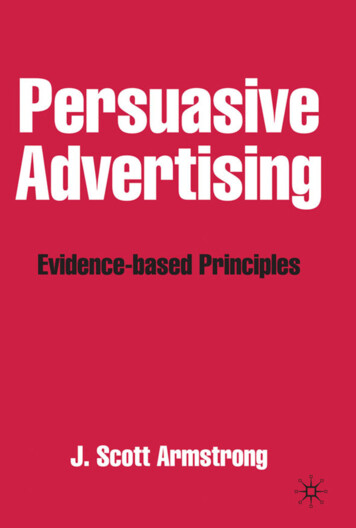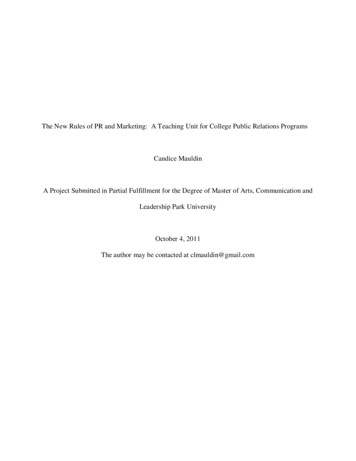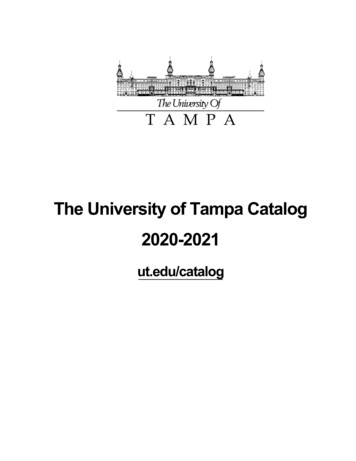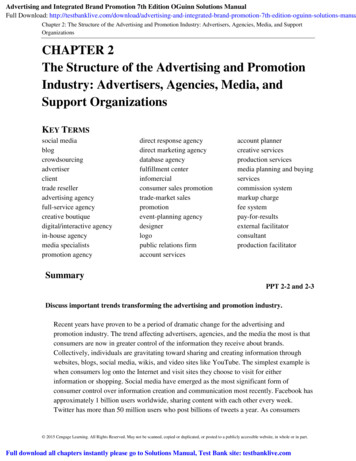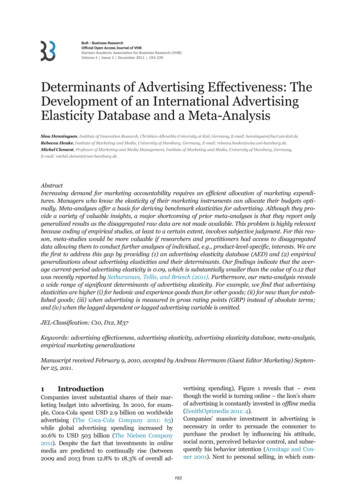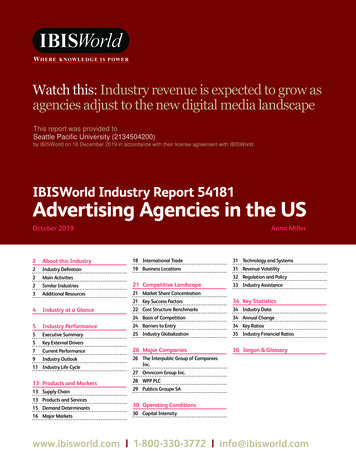
Transcription
Presenting a live 110‐minute teleconference with interactive Q&ADirect Mail Advertising and Sales Tax Challenges:Latest Developments With Differing State PoliciesTracking and Managing Exemption, Nexus, Sourcing, Use Tax and Other Related IssuesTHURSDAY, AUGUST 23, 20121pm Eastern 12pm Central 11am Mountain 10am PacificToday’s faculty features:Matthew Schaefer,, State and Local Tax Partner,, Brann & Isaacson,, Lewiston,, MaineMartin Eisenstein, Member, Brann & Isaacson, Lewiston, MaineFor this program, attendees must listen to the audio over the telephone.Please refer to the instructions emailed to the registrant for the dial-in information.Attendees can still view the presentation slides online. If you have any questions, pleasecontact Customer Service at1-800-926-7926 ext. 10.
Conference MaterialsIf you have not printed the conference materials for this program, pleasecomplete the following steps: Click on the sign next to “Conference Materials” in the middle of the lefthand column on your screen.screen Click on the tab labeled “Handouts” that appears, and there you will see aPDF of the slides for today's program. Double click on the PDF and a separate page will open. Print the slides by clicking on the printer icon.
Continuing Education CreditsFOR LIVE EVENT ONLYAttendees must listen to the audio over the telephone. Attendees can still viewthe presentation slides online but there is no online audio for this program.Attendees must stay on the line for at least 100 minutes in order to qualify fora full 2 credits of CPE. Attendance is monitored as required by NASBA.Please refer to the instructions emailed to the registrant for additionalinformation. If you have any questions, please contact Customer Serviceat 11-800-926-7926800 926 7926 ext. 10.
Tips for Optimal QualitySSoundd QualityQ litFor this program, you must listen via the telephone by dialing 1-866-873-1442and entering your PIN when prompted. There will be no sound over the webco ect o .connection.If you dialed in and have any difficulties during the call, press *0 for assistance.You may also send us a chat or e-mail sound@straffordpub.com immediately sowe can address the problem.Viewing QualityTo maximize your screen, press the F11 key on your keyboard. To exit full screen,press the F11 key again.again
Direct Mail Advertising and Sales TaxCh llChallenges:LatestL t t DevelopmentsDlt WithDiffering State Policies SeminarAug. 23, 2012Martin I. Eisenstein, Brann & IsaacsonMatthew P. Schaefer, Brann & .com
Today’s ProgramFoundationalFd tilCConceptst[Matthew Schaefer]Slid 7 – SlideSlideSlid 24Latest State Actions Affecting Direct Mail[M tth[MatthewSSchaefer]h f ]Slide 25 – Slide 34Examples of Specific States[Martin Eisenstein]Slide 35 – Slide 41Nexus Issues[Martin Eisenstein]Slide 42 – Slide 57Taxabilityb l off Postage/Shippingh[Martin Eisenstein]Slidel d 58 – Slidel d 62
Matthew P. Schaefer, Brann & IsaacsonFOUNDATIONAL CONCEPTS
How Do States Define “DirectDirect Mail”?Mail ? Streamlined Sales and Use Tax Agreement (SSUTA) definition Direct mail means printed material delivered or distributed byU.S. mail or other delivery service to a mass audience or toaddressees on a mailing list provided by the purchaser or at thedirection of the purchaser, when the cost of the items are notbilled directly to the recipients. “Direct mail” includes tangiblepersonal property supplied directly or indirectly by thepurchaser to the direct mail seller for inclusion in the packagecontainingg the printedpmaterial. “Direct mail” does not includemultiple items of printed material delivered to a single address.(underlining added) A li bl inApplicablei nearlyl 25 statest t8
How Do States Define“Direct Mail”? (Cont.) Other states define a broader category of materials (e.g.,“promotional materials”) or a narrower subset (e.g.,“cooperative” direct mail) for particular tax treatment. Some states have no specific definition and treat direct maillargely like they do other tangible personal property.9
Greater Regulatorygy Focus OnPromotional Direct Mail SSUTA subcategories “Advertising and promotional direct mail”: “Other direct mail”: Printed material that meets the SSUTA definition ofdirect mail, the primary purpose of which is to attractpublicbli attentiontt ti tto a product,d t person, bbusinessiororganization, or to attempt to sell, popularize orsecure financial support for a product [or service],person, business or organizationAny direct mail that is not “advertising andpromotional direct mail,” regardless of whether“ d“advertisingi i andd promotionalil didirect mail”il” iis iincludedl d din the same mailingSeveral non-SSUTA states have specific treatment for promotionaldirect mail.10
Wh IsWhatI TheTh SSUTA?A A multi-stateA.lti t t compactt among participatingti i ti states,t teachh off whichhi hmust substantially conform its laws to the terms of the Agreement.B. “It is the purpose of this Agreement to simplify and modernizesalesl andd use ttax administrationd i i t ti iin ththe memberb statest t iin orderd ttosubstantially reduce the burden of tax compliance.”C. Twenty-four member states (25 on 10/1/12, when Utah joins)1. Arkansas, Georgia, Indiana, Iowa, Kansas, Kentucky, Michigan,Minnesota, Nebraska, Nevada, New Jersey, North Carolina,North Dakota, Ohio, Oklahoma, Rhode Island, South Dakota,TTennessee,Utah,Ut h Vermont,Vt WWashington,hi gtWWestt ViVirginia,gi iWisconsin, WyomingD. Conforming legislation frequently introduced in other states11
Examples Of Types OfDi t MDirectMailil MaterialsM t i l These items are generally considered to be advertising/promotional direct mail,although some may be excluded in certain jurisdictions: Mail order catalogs Flyers/brochures Ad ti i circulars/newspaperAdvertisingi l /iinsertst Coupons (sometimes “cooperative” direct mail) Advertising folders, envelopes These items are generally not considered to be advertising/promotional direct mail,mailbut some may qualify in certain jurisdictions: Non-printed advertising materials such as video tapes, computer disks,refrigerator magnets, etc. (unless they fall within a state’s definition ofpromotional materials))p Billing invoices/account statements Stockholder reports Legally required mailings Privacy notices12
Overview Of TaxabilityOf Direct Mail As “tangible personal property,” direct mail is presumptivelysubject to state and local use tax, unless an exemptionapplies. A number of large states have exemptions for some typesof direct mail (e.g., CA, NY, PA, OH, IL, VA). SSUTA member states all subject direct mail to tax (withexceptions for specific types in Wisconsin and Oklahoma).In some cases, the purchase of services associated with theproduction or delivery of direct mail may not be taxable (e.g.,advertising or letter shop services). But, this seminar focusesprimarily on the tax treatment of the tangible mail pieces.pieces13
Delivery Charges For Direct Mail As a percentage of the total cost of a transaction,shipping/transportation/postage is typically much higher fordirect mail than for other products (such as consumer goods). Many states exclude separately stated delivery charges fromthe sales price, for purposes of calculating sales and use tax. The SSUTA permits its members to have special rules for thetax treatment of delivery charges for direct mail.14
Delivery Charges ForDirect Mail (Cont.)A. Under the SSUTA, unless delivery charges are stated separatelyon the invoice, they are not eligible for exclusion from sales tax.B. If delivery charges are stated separately, SSUTA member statescan choose whether to exclude them from sales tax, or toexclude specific aspects of delivery charges:1. Handling,g, crating,g, ppacking,g, ppreparationpfor mailingg ordelivery, and similar charges2. Transportation, shipping and similar charges3 Postage3.P t15
Exemptions Available By Statute, As Well AsUnder Court And Administrative DecisionsA.BB.Statutory exemptions:1.California “printed sales messages” exemption (Cal. Rev. & Tax. Code§ 6379.5; Cal. Code Regs. §1541.5)2.New York “promotional materials” exemption (NY Tax Law§1115(n)(4))3.Massachusetts “direct and cooperative direct mail promotionaladvertising materials” exemption (Mass. Gen. L. Chap. 64H, §6(ff))ExemptionsEtibyb courtt ddecisioni i or administratived i i t ti rulingli ffor materialst i ldelivered from outside the state by U.S. mail:1.Michigan (Sharper Image Corp. v. Department of Treasury, 550 N.W.2d596 (Mich.(Mich App.App 1996))2.Illinois (see Ill. Department of Revenue, General Information Letter ST01-0003-GIL (Jan. 5, 2000))3.Virginiag(see(Rulingg of VirginiagTax Commissioner,, P.D. 97-61 ((Feb. 10.1997))16
Typical Tax Issues For Purchasers Is my company subject to a sales/use tax obligation in the state(s) where weare mailing? Do direct mail materials qualify for an exemption and if so, in whichjurisdictions? What is the correct exemption certificate to issue the printer,where applicable? Is ppostage/shippinggpp g exemptp and if so,, in which jjurisdictions? Does the printer charge tax, where applicable? Will my company’s IT system properly accrue the correct use tax, whereapplicable,li bl if theth printeri t doesdnott chargehththe appropriatei t ttax? Are there storage issues with direct mail advertising literature or materials?17
Typical Tax Issues For Printers Is my company required to collect the state’s sales/usetax? Have we obtained a direct ppayy or exemptionpcertificate? Does my company have nexus in the state? DDoesththe purchaserhhhave nexus? Does the mailing list received from my customercontain the information needed to comply withsourcing rules? Does my billing system have the ability to charge theappropriate tax for each jurisdiction? Are there storage issues with direct mail materials?18
SSourcingi IssuesI What state’s (and possibly locality’s) law applies todetermine if tax is due? Which party — the seller or the purchaser — bears theresponsibility for determining and collecting/reporting theapplicable tax?19
SSourcingi Issues:ITaxabilityTbili The majority rule is “destination” sourcing, i.e.,the sales/use tax is determined under the law ofthe jurisdiction where the tangible materials areultimatelylti t l ddelivered.lid For example,p , the SSUTA ggenerallyy pprovides for“destination” sourcing (SSUTA, Section 313), but The SSUTA permitsThit ““origin”i i ” sourcing,iunderd whichhi hthe sales/use tax is determined based on the pointof sale, for intrastate sales (but adopted so far byonly two member states).states) (SSUTA(SSUTA, SectSect. 313313.1)1)20
SSourcingi Issues:ITaxabilityTbili (Cont.)(C) In addition, several non-SSUTA states (e.g., AZ, IL, PA, TX)have a general rule that calls for “origin” sourcing. However: Such “origin”origin sourcing rules may apply only to intrastatetransactions/deliveries, and In the case of interstate sales, including the delivery ofdirect mail to other states, such rules are typicallysuperseded by express exemptions, rules or enforcementpractices that acknowledge underlying constitutionalprinciples applicable to interstate commerce (and thusresult in destination sourcing based on the “use” of directmail in the state(s)( ) where it is delivered).)21
SSourcingi Issues:ITaxabilityTbili (Cont.)(C) The structure of a direct mail transaction may create challenges indetermining what state’s law applies. If a printer does not also arrange for mailing to end user recipients, butinstead delivers in bulk to a purchaser or letter shop to complete themailing, then the purchase of direct mail may be viewed as a bulk sale. If a printer lacks sufficient information to allocate and source a sale ofdirect mail based on the delivery location(s), the printer may be requiredto collect sales tax under a default assumption. The SSUTA requires the printer to source to the shipping location foradvertising and promotional direct mail, and to the address of thepurchaser for “other” direct mail. (SSUTA, Section 313.A.4, B.1) Non-SSUTA states may vary, creating challenges for the printer.22
SSourcingi Issues:IWhoWh MustMReport?R? Typically, a seller must determine sourcing and collect anyapplicable sales/use tax. (Note: The purchaser is only relievedof the obligation if the seller collects.) Because direct mail is delivered to multiple jurisdictions, as towhich the seller mayy have insufficient information for taxpurposes, direct mail presents potential difficulties for theseller. The SSUTA, and some non-SSUTA states, offer procedures orexemptionspthat pplace sourcingg and reportingpg burdens on thepurchaser.23
Sourcing Issues: WhoMust Report? (Cont.) Under the SSUTA, a seller is relieved of the obligation to collect taxwhen the purchaser provides a direct pay permit or a “direct mailcertificate” indicating that the purchaser will report tax. (SSUTA,S ti 313Section313.A.2,A2 BB.2)2) Some states pprovide expresspexemptionspfrom tax for direct mailmaterials delivered to locations outside the state. (Such exemptionsdo not mean that the destination state’s tax is inapplicable,however.) The issue may be complicated where a purchaser lacks nexus in thedestination state(s).state(s)24
Matthew P. Schaefer, Brann & IsaacsonLATEST STATE ACTIONSAFFECTING DIRECT MAIL
Expanded Catalog ExemptionIn Wisconsin Existing statutory provisions (§77.54(15), §77.54(25m)) exempt specificcategories of direct mail materials, including in particular catalogs. Wis. Stat. §77.54(59) expands the exemption, effective July 1, 2013, toencompass all advertising and promotional direct mail. Exempt from salesand use tax is “[t]he sales price from the sales of and the storage, use, orother consumption of advertising and promotional direct mail.” SSUTA definition (same as Wis. Stat. §77.51(1ag)): “Advertising andpromotional direct mail” means direct mail that has the primarypurpose of attracting public attention to a product, person,business, or organization or to attempt to sell, popularize, or securefinancial support for a product, person, business, or organization.”26
Val‐Pak East Valley, Inc. v.Arizona Dept. Of Revenue Vendor/franchisee of cooperative direct mail advertisingargued that it was not subject to sales/use tax on direct mailmaterials distributed in Arizona. Val-Pak East Valley assembled orders for advertising flyersand coupons, then sent orders to a Florida affiliate. Affiliate created, packaged and mailed envelopescontaining flyers and coupons to Arizona residents fromout-of-state.27
Val‐Pak East Valley v. ArizonaDept. of Revenue (Cont.) Arizona Court of Appeals agreed that no sales/use tax was due, ontwo grounds: First, the Court agreed that under the “dominant purpose” and“common understanding” tests, Val-Pak East Valley waspurchasing non-taxable “design, printing, and mailing” services,not taxable tangible personal property, from its Florida affiliate.28
Val‐Pak East Valley v. ArizonaDept. Of Revenue (Cont.) Second, the Court rejected the department’s argument that Val-PakEast Valley controlled the distribution of the direct mail pieces. Affiliate purchased all physical supplies (e.g. paper, ink,envelopes, postage, etc.), and had control over design andcreation of catalogs. Decision contrasted Val-Pak East Valley’sy business with retailers’control over catalog distribution in earlier Service Merchandise(1996) case, refined in Sharper Image (1998) case. The Court found that ValVal-PakPak is exempt because it is not“exercising any right or power over tangible personal propertyincidental to owning the property.”29
EExtensioni Of VirginiaVi i i EExemptionsi Virginia has three established statutory exemptions, recently extended by theVirginia General Assembly (Senate Bill 393 (Chapter 477) amending VA Code Ann.§58.1-609.6) The bill leaves in place the exemption for direct mail such as catalogs, letters,brochures and reports when stored at a Virginia printer for less than 12 monthsand then distributed outside the state (but envelopes, containers, labels andpaper are not exempt). papplicablepptoIn addition,, the statute continues a sales and use tax exemptionthe purchase of printing/printed materials by “advertising businesses,” whenthe resulting printed material is distributed outside Virginia within 12 months. Finally, the exemption for advertising businesses that purchase newspaper ormagazinei insertsit forf distributiondi t ib ti isi extendedt d d ffrom JJulyl 11, 2012 tto JJulyl 11, 20172017.According to the Taxation Department, newspaper supplements purchased byadvertising agencies for placement in in-state or out-of-state publications arealso exempt. (Virginia Department of Taxation Legislative Summary 2012)30
Indiana Department of StateRevenue v. AOL , LLC Under prior Indiana Tax Court decisions (Ameritech I (2006)and Ameritech II (2009)), Indiana law provided an exemptionfor direct mail materials when the purchaser supplied rawmaterials that were entirely consumed by the vendor inproducing the final product distributed to recipients in thestate. In this case, AOL contracted for the creation and distributionof promotional materials to recipients in Indiana by thirdpartyt contractors.t t31
Indiana Department of StateRevenue v. AOL, LLC (Cont.) AOL argued that it had acquired raw goods that it supplied to itsvendors, then paid for assembly and printing services, and did notacquire the finished promotional direct mail materials in any retailttransaction.ti The Indiana Supreme Court held that AOL was subject to use tax onthe direct mail materials. In response to the argument that AOL was purchasing services asopposed to tangible personal property, the court ruled that “theassembly houses and letter shops were selling at retail,” despitethe fact that AOL supplied the raw material. Because it found that AOL acquired goods in a retail transaction,the court ruled that use tax appliedppwhen AOL used the ggoods inIndiana.32
DiDirectMMailil SSourcingi InI OklahomaOkl h The Oklahoma Tax Commission recently amended its ruleregarding direct mail sourcing to adopt definitions of“advertising and promotional direct mail” and “other directmail,” in accordance with the SSUTA (Okla. Rule 710:65-18-6). The revised rule makes clear that “advertising andpromotional direct mail” is taxable and sourced in accordancewith the SSUTA (Sect. 313). The rule states that “other direct mail” is not taxable underOkl hOklahomalaw.lThTherefore,fno sourcingi rulesl are specified.ifi d33
WWestVirginiaVi i i SSUTA MatrixM i For a number of years, it was the practice ofthe West Virginia Revenue Department toallow the exclusion of postage charges fromthe tax base for direct mail. In connection with its membership to theSSUTA, the department has stated, andrevised its taxability matrix to reflect, thatall delivery related charges, includingpostage, associated with direct mail aresubjectjto sales/use tax.34
Martin I. Eisenstein, Brann & IsaacsonEXAMPLES OF SPECIFICSTATES
Examples Of Specific States:Pennsylvania Statute (72 P.S. §7204(35)) exempts: Mail order catalogs Advertising literature or materials, which are definedas tangible personal property that is intended topromote business interest, create goodwill or engagethe attention or interest of a recipient, which includesenvelopes, address labels, reply envelopes andapplication forms (Reg. Sect. 31.29) Advertising inserts as part of a newspaper One-time use of a list of names (list rental) andmailing addresses36
Examples Of Specific States:Pennsylvania (Cont.)(Cont ) Keyy requirement:qDistributed throughg the U.S. Postal Service Will be deemed taxable if distributed by other means (SeeReg. Sect. 31.29)Key exclusion from exemption: If the advertiser supplies paper, printing charges aresubject to sales tax and direct advertising exemption doesnot apply (61 PaPa. ADC §32.36).§32 36) Quaere whether printing on advertiser-supplied paperoutside of Pennsylvania is subject to use tax.Note: NoNN requirementithath advertiserdibbe theh maileril MerionM iPublications, Inc. v. Commonwealth, 890 A.2d 436(Commonwealth Court 2006)37
Examples Of Specific States: Florida Statute (Fla. Stat. §212.08(7)(w)) exempts: Free Ci l t d publicationsCirculatedbli ti Published on a regular basis Composed of primarily advertising Distributed through the mail, home delivery ornewsstandDepartment strictly construes exemption38
Examples Of Specific States:Fl id (Cont.)Florida(C) Catalogs and other direct advertising materials arguablyfit within this definition. The biggest issue regarding promotional materials isshowing regular basis. Department argues that catalogs distributed ondifferent days in a month, from year to year, may notmeet the regularity requirement.39
ExamplespOf SpecificpStates: Ohio Statute exempts sales on which: (1) The “purpose” of the consumer is to use or consume thethings transferred in making retail sales; and (2) The itemsare newspaper inserts, catalogs, coupons, flyers, giftcertificates or other advertising material that prices anddescribes tangible personal property offered for retailsale. (Rev. Code Ann. Sec. 5739.02(B)(35)) Also exempts printed matter that offers free merchandiseor chances to win a sweepstakes,sweepstakes if mailed to potentialcustomers with materials described in the first bullet40
Examples Of Specific States:Ohio (Cont.)(Cont ) DistributionDit ib ti bby ttaxpayer tto retailt il storestoff storetdidisplaysldoes not satisfy the requirement that the consumer usethe materials transferred in making retail sales Opinion of Tax Commissioner 94-004Ohio statute suggests requirements that materials bedistributed by advertiser to consumer for ordering. Thiscontrasts with PA statute.41
Martin I. Eisenstein, Brann & IsaacsonNEXUS ISSUES
NNexusIssues:IGeneralGl Quill (504 U.S. 298 (1992)) sets theconstitutional standard. QQuillill requiresiththatt a retailert il hhave a physicalh i lpresence. Through its own employees,employees properties orfacilities Attribution nexus: Agent/representative43
NNexusIssues:IGeneralGl (Cont.)(C) Quill states (quoting Bellas Hess): There is a “sharp distinction between mail-order sellerswith retail outlets, solicitors, or property within a stateand those who do more than communicate with customersin the state by and or common carrier as a part of generalinterstate business.” (505 U.S. at 307) (emphasis added)Few court cases regard presence of inventory. AdvanceMagazineMagae Publishers,ubl s e s, Inc.c. v. Huddleston,uddlesto , CChancerya ce y CouCourt,t,th20 Judicial District (Tennessee), ¶400-560, (Aug. 20, 1997)– Presence of inventory of paper at printer does notestablish franchise tax nexus. But, see statement in Quill that Quill did not havenexus because it did not own tangible personalproperty; also, see AOL v. Johnson (Tenn. Ct. App.2002) (presence of modems in state creates nexus)44
NNexusImplicationsIli iToT MailerM il Storageg of paperp p Most large promotional materials mailers contract with paperbrokers or directly with mills to purchase paper, and causepaper to be supplied to the printer or printers.printers Paper must be stored at the printer for short or longerperiods. Storage of paper creates a high nexus risk in the state of theprinter, but an argument can be made otherwise. See previous slide Does the activity “make a market” in the state for theout-of-state mailer? (see Tyler Pipe Industries, Inc. v.WA. State Dept. of Revenue, 483 U.S. 232 (1987))45
Nexus Implications To Mailer (Cont.) Solutions Transfer of title to printer AccomplishedAli h d withith bill off salel tto printeri t Invoice price from printer includes cost of paper((Avoid up-chargepg or paperp p managementgfee)) Issues Requires accounting for paper Credit risk? Is there economic substance?46
Nexus Implications To Mailer (Cont.) S l tiSolutionsre: paper storage:tPPrinti t iin statest t withith safef dianaKentuckyMaineMinnesotaSTATUTE – REGULATION ‐ CODECGA § 12‐407(15)(b),( )( ), 12‐213(a)(20)(B)( )( )( )FL ST § 212.0596(2), 212.06(2)(d) TechnicalAssistance Advisement, No. 06A‐03OCGA § 48‐7‐135 ILCS § 105/2(1), 35 ILCS § 5/205(f)IN Code § 6‐2.5‐3‐1, 6‐2.5‐8‐8.5,6‐3‐2‐2.3KRS § 139.340(2), 139.470(13)36 MRSA § 1754‐B(1)(G)(5)MN ST § 297A.66 (Subdivision 3)(b)47
Nexus Implications To Mailer (Cont.) S l tiSolutionsre: paper storage:tPPrinti t iin statest t withith safef hharborsbSTATEOhioOklahomayPennsylvaniaSouth CarolinaUtahVirginiaWest VirginiaWisconsinSTATUTE – REGULATION ‐ CODEORC § 5741.17,, 5733.09(D),( ), 5747.30b68 OS § 137672 PS § 7201SC Code § 12‐36‐75, § 12‐6‐555UT Code § 59‐7‐102(2)VA Code § 58.1‐401(7), 58.1‐612(D)TAA 96‐003WSA § 77.51(13h), 71.23(3)48
Nexus Implications To Mailer (Cont.) Possible limitations on safe harbors Maine and Minnesota do not specifically permit storage of paperat printer. g of catalogsg is not necessarilyy exempt.pStorage Don’t take title to catalogs or mailings until sent byinterstate commerce, not when invoiced by printer. Visits by personnel of mailer to state may not be protected inFlorida, Georgia, Kentucky, Maine and Minnesota; because thesafe harbor in the statute doesn’t address whether visits createnexus. Constitutional argument: Infrequent visits to state don’t createnexus. (See Dept of Rev. v. Share International, Inc. 676 So.2d.1362 (Fla. 1996), Appeal of Intercard, Inc., 14 P.3d 1111 (Kan.2000) but see Orvis CoCo., Inc.Inc v.v Tax AppApp. Tribunal of New York 654N.E.2d 954 (N.Y. 1995))49
Nexus Implications To Mailer (Cont.) Potential issues: When work is done in more than one state, of which one state has a safeharbor and the other state does not; for example, one facility prints pages 125 and25,d ffacilityilit iin anotherth statet t printsi t ththe remainingi i pages Make sure that the contract specifies that the printing facility in the safestate is responsible for the printing job, including mailing of materials.Useful tips: Include anti-agency clauses in contracts Don’t store catalogs or promotional materials with printers unless, based onreview of statute, it is safe to do so. printer should specifypy states where pprintingg takes pplace.A contract with p50
Other Nexus Implications To Mailer Basic principle: Mailing promotional materials from outside of state into a state doesnot create nexus in the destination state. But, distributing promotional materials in a state may create nexus. Example: Catalogs at trade shows or kiosks Example: Coupons Tax authorities could argue that the person distributing is an agent orrepresentative soliciting sales in the state; i.e. the person is helping to makea market in the state for the advertiser. See Borders Online, LLC v. Cal. Board of Equalization, 129 Cal.App. 4th1129 (Cal. App. 2005) and the Appeal of Scholastic Book Clubs, Inc., 920P2d 947 (Kan. 1996)Electronic catalogs California statute in effect on Sept. 15, 2012 (Act ABX1-28 to amend Ca. Rev. and Tax. Code§6203) If not commission-based, then does not create nexus51
Lack Of Nexus Of Mailer: Is TaxDue From The Printer? The problem: Printers frequently have nexus withmany states other those in whichprinting takes place. Is a printer required to collect tax onpromotional materials mailed/sent to astate where the mailer does not havenexus? For a state other than one in whichmaterials are printed, i.e. a use tax52
Lack Of Nexus Of Mailer: Is UseTax Due From The Printer? (Cont.) Constitutional argument against use tax in destination statesbecause of lack of substantial nexus with transaction underComplete Auto Transit four-prong test: Complete Auto Transit, Inc.v. Brady, 430 U.S. 274 (1977); also D.H. Holmes Company, Ltd. v.McNamara, 486 U.S. 24 (1988) based on nexus aplenty of thepurchaser of catalogspg Most state laws impose use tax on purchaser and require the sellerto collect. Argument is that since tax cannot be imposed on the purchaser,printer has nothing to collect.53
Lack Of Nexus Of Mailer:Is Sales Tax Due? Is the situation different for catalogs shipped withinthe state where the printer’s facility is located? Arguably a difference, since this is a sales tax The state has a substantial nexus with thetransaction. ButBut, if sales tax under the statute is imposedon the purchaser and not the seller, then theargument is that like the use tax, a sales taxshould not be imposed on the purchaser since itdoes not have nexus with the state. Conclusion: It is critical for printers and mailers todetermine the kind of tax at issue (sales tax or usetax) and the incidence of the tax.54
Lack Of Nexus Of Mailer:Is Use Tax Due? Most printers permit a no nexusletter or accept an exemptioncertificate that is a variation of theMTC Multijurisdictional TaxCertificate or the SSTUA ExemptionCertificate (see attached).attached)55
Lack Of Nexus Of Mailer:Is Use Tax Due? (Cont.) Sect. 317 of SSTA, and Rule 317.1, providethat a seller is relieved of liability if itobtains a fully completed paper exemptioncertificate or an electronic filing that hasall of the information contained in theSSTA form. Sect. 5 of SSTA form provides anexemption category (L) of "Other. Lack of nexus can be deemed “Other.”56
Lack Of Nexus Of Mailer:Is Use Tax Due? (Cont.) Does the lack of nexus constitute an adequate basis for anexemption certificate? Most state laws provide an exemption or exclusion fromtax, if imposition of tax is unconstitutional. See, e.g., Code of Iowa §423.3; WY Statutes §39-16105(a)(i)(A) Good faith basis for printer to receive such a certificate57
Martin I. Eisenstein, Brann & IsaacsonTAXABILITY OFPOSTAGE/SHIPPING
Taxabilityy Of Postage/Shippinggpp gSTATESALES TAX ON SHIPPING COSTSExcluded if (1) shipped by common carrier and (2) charges are billedAlabamaseparatelyt l
direct mail than for other products (such as consumer goods). Many states exclude separately stated delivery charges from the sales price, for purposes of calculating sales and use tax. The SSUTA permits its members to have special rules for the tax treatment of delivery charges for direct mail. 14
